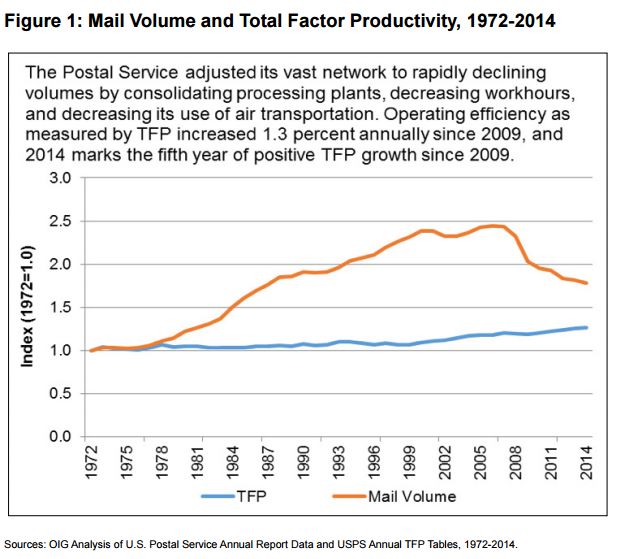
How the Postal Service can turn its financial luck around
The Postal Regulatory Commission mandated that USPS reduce its postal rates for the first time in 100 years, a move that could cost the organization more than $2...
The U.S. Postal Service didn’t celebrate its rare $307 million first-quarter profit in February, after Postmaster General Megan Brennan warned of strong “headwinds” that were projected to undo the agency’s optimism for the rest of the fiscal year.
On April 10, the Postal Regulatory Commission mandated that USPS reduce its postal rates for the first time in more than 100 years, a move that could cost the organization more than $2 billion in annual revenue.
The PRC allowed for the temporary increase in January 2014, in order for USPS to recoup losses sustained during the 2008 national recession. Following the change, the standard postal rate for letters is now 47 cents per ounce, down from 49 cents.
“Given our precarious financial condition and ongoing business needs, the price reduction required by the PRC exacerbates our losses,” said Brennan said in a statement ahead of the postal rate change.
The reduction in revenue, together with a requirement from Congress since 2006 to pre-fund health retiree benefits for postal workers, saddles the Postal Service with new burdens and few options to bounce back from the financial blow.
The American Postal Workers Union, which represents more than 200,000 postal employees, said the 2-cent reduction in postal rates benefits major mailers — like credit card and insurance companies — stand to benefit, but hurts USPS’ bottom line and postal customers.
“The PRC ruling that required the Postal Service to lower postage rates is bad for postal patrons — and for the Postal Service. We want our customers to enjoy the lowest postage rates possible, but postage can’t be so low that it undermines service and undermines the institution,” APWU Mark Dimondstein said in a statement to Federal News Radio. “The 2-cent reduction won’t save individual mailers much money at all, but it will have a very negative effect on the Postal Service’s finances. Ultimately, it will undermine service and weaken a great national treasure.”
In an April 18 report, the Postal Service inspector general gave a nod to agency management for finding $13.7 billion in cost savings over the last decade amid declining volume and revenue. Those savings include a $10.2 billion cut in labor costs and a reduction in mail processing centers nationwide.
“Our research shows that these problems stem less from a failure of cost management and more from mandated contributions to future retiree health benefits,” the IG report said.

Chris Edwards, director of tax policy studies at the Cato Institute, told Federal News Radio that Congress has been slow to react to the Postal Service’s dire financial situation.
“To the the USPS management’s credit, they have done a good job cutting costs in a lot of places. The size of the USPS workforce is way down. But Congress blocks a lot of these cost-cutting ideas,” Edwards said. “Going ahead, if the mail volume continues to fall, the USPS is going to be in a desperate crunch for cash, and they will have to come to Congress eventually for a bailout from taxpayers.”
Penny-pinching aside, the postal watchdog has looked at increasing USPS’ revenue through its existing programs, such as issuing passports and money orders. But much like mail volume, the number of new U.S. passports being issued has also been on a downward trend. The Postal Service collected more than $216 million from passport services in fiscal 2015.
Edwards said Congress has over-strained the Postal Service through its pre-funding benefits mandate.
“There is no doubt that the U.S. Congress micromanages the Postal Service to its detriment, and ultimately the taxpayer’s detriment,” Edwards said. “The postal workers make a reasonable point when they note that there is this burden right now from having to pre-fund retirement health costs for the postal system,” he said. “But I would say to that, the vast majority of private sector workers in America do not receive health benefits from their company when they retire. And this is a unique perk that federal government workers and postal workers get.”
Even the White House has weighed in on the current state of the USPS, and what it can do to remain financially solvent.
Office of Management and Budget Director Shaun Donovan wrote in a blog post earlier this month that President Barack Obama’s fiscal 2017 budget proposal would bring back the temporary postal rate increase. The President’s plan also calls for an update to USPS’ current business model, which Donovan said would provide the agency with a projected $27 billion in additional revenue through 2020.
Donovan also called on Congress to pass much-need postal reform legislation.
The reduction or elimination of Saturday delivery, an idea championed by Rep. Darrell Issa (R-Calif.), has largely been defeated in Congress. Edwards said a five-day delivery model makes more sense, given the decline in letter volume.
“As the demand for any product in the private falls, logically businesses reduce their supply, and that’s what we ought to be doing with letter mail. Running all those 200,000 or so USPS delivery vehicles on Saturday doesn’t make any economic sense,” he said. “That’s the type of cost-cutting I think we could do if we got postal delivery sort of out of the clutches of the politicians that are in Congress.”
With all this talk of innovation, however, Edwards said government would be better off getting out of the postal business altogether. Countries like the United Kingdom, Germany, and the Netherlands have all embraced private mail services.
Edwards said this model would open the mail business to companies like FedEx and UPS, which already compete with the Postal Service in the lucrative package delivery sector.
“The USPS, because it has a monopoly now and because it’s kind of backwards looking, we’re not getting those sorts of experiments. So I’d like to open it up, let entrepreneurs do the experiments, and let’s see where the 21st century postal system would go.”
Copyright © 2024 Federal News Network. All rights reserved. This website is not intended for users located within the European Economic Area.
Jory Heckman is a reporter at Federal News Network covering U.S. Postal Service, IRS, big data and technology issues.
Follow @jheckmanWFED



